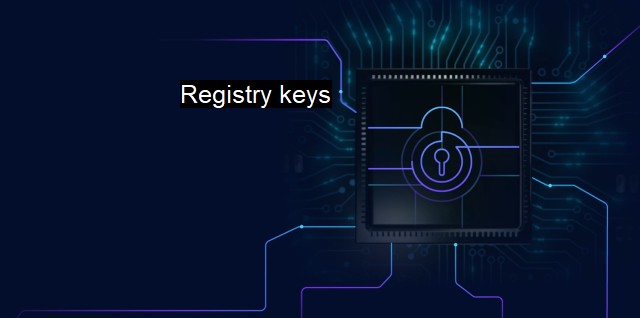What are Registry keys?
Understanding the Significance of Registry Keys in Cybersecurity and Antivirus: Risks, Vulnerabilities, and Importance in Protecting Windows-based Systems
Registry keys are essential components of the Microsoft Windows operating system. They are a central repository of configuration settings that allow the operating system and the software installed on the machine to work correctly. Cybersecurity professionals focus on registry keys as they hold crucial data about a computer's operation and can be a starting point for many kinds of cyberattacks.In further technical detail, a 'registry key' is a hierarchical database that stores low-level settings for the Microsoft Windows operating system and for applications that opt to use the registry. The version of the Windows operating system decides the structure of the registry and its details. On a literal level, the registry key functions in the same way as a physical key: it unlocks access to specific parts of the registry. They can contain values directly, such as a String or DWORD value, or another registry key - making them nested similar to files within folders.
From a cybersecurity perspective, unauthorized manipulation of registry keys represents a considerable risk. Skilled attackers can use registry keys to enable, disable, or otherwise modify functions to compromise a system or steal data —often undetected. Sorting out the changes that an application makes to registry keys might be a heartache due to their multitude— a typical computer has tens of thousands of these keys. Therefore, a cybersecurity plan needs to include control and monitoring of registry keys to prevent unauthorized changes.
Antivirus software contributes much towards this task. It usually features registry key protection, where it scans and flags any unusual changes to these keys. if a virus or other form of malware attempts to alter a registry key to execute its payload every time the system starts, the antivirus software would detect and block such behavior. most sophisticated antivirus software will also have heuristic capabilities. This means that even if a previously unseen or unknown piece of malware tries to modify the registry keys in a potentially damaging way, there's still a good chance the antivirus could prevent it.
Registry keys can pose both internal and external threats. Internally, user actions such as downloading unsafe files, not regularly updating software, or using weak passwords can lead to registry attacks. Externally, cybercriminals can manipulate vulnerable registry keys, commonly delivering payloads through phishing emails or malevolent websites.
Keyloggers are one pervasive malicious software that attacks registry keys. They covertly record a user's keystrokes, including entered passwords, and transmit the information back to the hacker. A keylogger executes this by manipulating the registry key linked to the keyboard, laying dormant and undetected until activated by the hacker from a remote location.
Similarly, advanced persistent threats (APTs) often target registry keys. APTs typically aim at high-value targets like large corporations or governmental bodies and involve extended stealthy and primarily unnoticed attacks. The attackers persistently deep dive into the network to extract data, often exploiting registry keys.
Managing and protecting registry keys is fundamental. Establishing well-defined procedures for making changes to these elements and monitoring any changes closely for signs of unauthorized manipulation or malware infection is central to any robust cybersecurity strategy. Antivirus and cybersecurity software are paramount to protect such a critical part of a system, emphasizing the interrelation of registry keys, antivirus software, and wide behavioural patterns in comprehensive cybersecurity.
Registry keys, while a mundane and intrinsic part of Microsoft Windows’ inner workings, deduced its significance within the complex landscape of cybersecurity. Exploring them exposes their dual-paradoxical nature: On the one hand, they're essential to the maintenance and systemic operations of software, while on the other, they present digital loopholes waiting to be exploited, emphasizing the continued utmost need for vigilant cybersecurity that incorporates disruptive antivirus solutions.

Registry keys FAQs
What are registry keys?
Registry keys are entries in the Windows Registry that store configuration settings for software, hardware, and the operating system.Why are registry keys important in cybersecurity?
Registry keys can be targeted by malware and other cyber threats to modify system settings, bypass security settings, and gain persistence on infected systems. Monitoring and analyzing changes to registry keys can help detect and prevent these attacks.How can antivirus software use registry keys?
Antivirus software can use registry keys to store information about malware signatures, scan results, and other security-related data. It can also monitor changes to registry keys associated with known malware or suspicious behavior and alert users or take action based on those events.Can manual changes to registry keys affect antivirus software?
Yes, manual changes to registry keys can potentially interfere with antivirus software if they modify settings or values that the software depends on. It's generally recommended to avoid making manual changes to registry keys unless you have a good understanding of their purpose and potential impact.| | A | | | B | | | C | | | D | | | E | | | F | | | G | | | H | | | I | | | J | | | K | | | L | | | M | |
| | N | | | O | | | P | | | Q | | | R | | | S | | | T | | | U | | | V | | | W | | | X | | | Y | | | Z | |
| | 1 | | | 2 | | | 3 | | | 4 | | | 7 | | | 8 | | |||||||